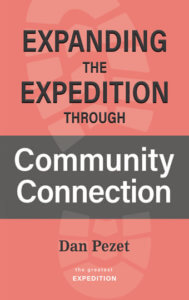Dan Pezet believes churches can forge meaningful connections with their neighbors through impactful community ministries. But only if the church’s motives are perceived as genuine, not self-serving. He outlines four mindset shifts required of church leaders who seek to engage their community more authentically.
For a society that is skeptical of the Christian church, it is a breath of fresh air to see a congregation out in the neighborhood putting its faith into action. The people of our society are still mostly spiritual, and there is a fundamental desire in our society (especially among younger generations) to do good. This is where the church meets a need in our society today. This is where the church can and should be relevant. The church is an organization that does good, and the people of our society are looking for ways to do good. It sounds like a match made in heaven! It is at this intersection where we can connect with new people today.
But remember that part of the key to connecting with your community is to be authentic. It is our authentic witness of putting our faith into action that speaks the truth of Jesus Christ to our community. If your church is going out into the community to do anything but show love for your neighbors, the community will know. People have learned to sniff out inauthentic relationships from a great distance, rendering any attempt to make connections fruitless.
To ensure that we are authentically engaging our neighbors, we need to do some intentional self-examination and train our leaders to keep from creating unhealthy expectations for connecting with new people and make the shift toward healthy connections. Let’s explore some unhealthy to healthy shifts:
1. From transactional to sacrificial
Many churches see their neighbors as a resource the church needs to get what it wants. Why does the church want to connect with new people? Unhealthy answers tend to be:
- We receive an average of $2,500 per giving unit, so we need 15 more giving units to cover our deficit.
- We’re slowly dying off and do not have enough people to do the things that make our church happy. We need more volunteers!
- We need to validate our existence by saving souls!
Each of these reasons for reaching new people puts the church’s needs before the needs of community members. Yes, even the one about saving souls. There is an important difference between wanting to earn a gold star for introducing people to Jesus and introducing people to Jesus just because you love them. One is a transaction, where you get something in return, and the other is a gift freely given. People of today instinctively know this type of “transactional care” for the inauthentic relationship. They will stay clear. Jesus certainly did not value transactional relationships. He commanded his disciples to freely show love for our neighbors, just as Jesus freely showed love to His disciples.
2. From better than to equal to
Some of our church members believe that people who go to church are better than people who do not. Some stretch this belief and feel that they are on the side of righteousness and that those who do not attend church must be cured of their evil ways. This way of thinking creates an unhealthy basis for a relationship and is the self-righteous and hypocritical church that the community is wary of connecting with. Healthy churches recognize that we are all on a spiritual journey together and can all be at different places along that journey. Everyone has something to offer, no matter where they are on their journey. This perspective creates a sense of community and openness where no one person is better than another and allows the people of our community to lean on each other as we journey together.
3. From owning God to joining God
Like being “better than,” some churches believe that God only exists among church people to the point that the church takes ownership of God. Church members stuck in this way of thinking believe that when church members go outside the walls of the church, it is to take God into an otherwise godless community. Not only is this a theologically problematic understanding of God, but the community can sense church members looking down at them as if they were lesser human beings and they want no part of that relationship. Rather than this idea of taking God out into a godless world, churches with healthy relationships look for where God is already at work and join God there. Joining God means seeing God’s image in every person you meet in the community. Everyone has sacred worth.
4. From big church is successful to loving church is successful
A church does not have to be big to be a healthy, thriving church. However, it is often the case that thriving churches have such energy and connection with the community so that they grow. If your church is in decline, and you add 50 people but make no other changes, your church may see a boost in energy for a little while, but eventually it will decline again. This is because a church in decline does not need more people, more money, better buildings, or a young pastor with a family to grow. It requires a vision that loves the people of the neighborhood in meaningful ways.
Recognizing and removing these and other inauthentic motivations for connecting with your community is important because making disciples today means creating an authentic relationship where you can invite someone into a spiritual journey in an authentic way of sharing God’s love. We should never expect anything from anyone in return for us expressing our love of God for them. We have freely received, and so we should freely give.
 Excerpted from Expanding the Expedition through Community Connection (Market Square Books, 2021) by Dan Pezet. The book is available at Market Square Books, Cokesbury, and Amazon. Used by permission.
Excerpted from Expanding the Expedition through Community Connection (Market Square Books, 2021) by Dan Pezet. The book is available at Market Square Books, Cokesbury, and Amazon. Used by permission.
Related Resources
- Taking Church to the Community, a Lewis Center video tool kit resource
- Doing Evangelism with Integrity, featuring Priscilla Pope-Levison — Leading Ideas Talks podcast episode | Podcast video | In-depth interview
- 9 Strategies for Meeting People and Learning Their Needs by Elizabeth Mae Magill







